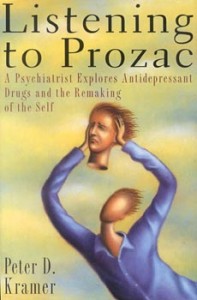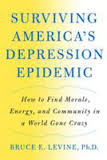There’s a reason that most so-called primitive cultures have avoided the depression epidemic afflicting industrialized nations. In a provocative book, a clinical psychologist suggests that adopting more hunter-gatherer habits can help us escape the blues.
According to the latest research, about one in four Americans — more than 70 million people — will meet the criteria for major depression at some point in their lives. The rate of depression in industrialized societies has been on the rise for decades — it’s roughly 10 times higher today than it was just two generations ago. How can people possibly be so much more vulnerable to depression now? And how do you make sense of the fact that even though antidepressant use has skyrocketed in recent years, the rate of depression in the United States hasn’t declined, but rather increased?

As a clinical psychologist, I believe the answer is rooted in our way of life. I say this because researchers have assessed modern-day hunter-gatherer bands — such as the Kaluli people of the New Guinea highlands — for the presence of mental illness, and they found that clinical depression is almost completely nonexistent among such groups.
Despite being much more likely to experience tragic events like the death of a child or a crippling illness, and living with none of the material comforts or medical advances we take for granted, they’re largely immune to the plague of depressive illness.
But how are hunter-gatherers able to weather life’s storms so effectively? Based on the available research, it seems that the hunter-gatherer lifestyle is profoundly antidepressant. As they go about their daily lives, they naturally wind up doing things that keep them from getting depressed, things that change the brain more powerfully than any medication. These range from exercising regularly and eating plenty of omega-3 fats to belonging to active social networks and getting enough sleep.
For most of human history, everyone benefited from the antidepressant effect of these ancient lifestyle elements. But over the past few hundred years, technological evolution has proceeded at a relentless pace. And as many protective features of that way of life have gradually disappeared, the rate of depression has begun to spiral out of control.
Our Stone Age brains just weren’t designed to handle the sedentary, isolated, indoor, sleep-deprived, fast food laden, stressed-out pace of 21st-century life.
Based on this information that shows lifestyle might be the most important factor in producing (and beating) depressive symptoms, my colleagues and I at the University of Kansas have developed a treatment called “Therapeutic Lifestyle Change,” or TLC. It incorporates six major protective lifestyle elements we need to reclaim from our ancestors: dietary omega-3 fatty acids, mentally engaging activity, physical exercise, sunlight exposure, social support and adequate sleep.
TLC has yielded exceptional results in our clinical trials; the rate of favorable response has been more than three times higher than that of conventional antidepressant treatments.
When you consider the far-reaching effects of the lifestyle changes below, it’s easy to understand why this approach is so effective — and why for anyone struggling with depression, it is almost certainly worth trying.
1. Feed Your Brain
The hunter-gatherer diet typically includes wild game that feed on grass, and fish that feed on algae — both abundant sources of omega-3 fatty acids. Conversely, the extraordinary rise in depression rates over the last century has closely mirrored the disappearance of omega-3 fats from the Western diet, which has come to rely more on grains (and grain-fed livestock) than wild game and plants. In countries where people still get a better dietary balance of omega-6s from seeds and omega-3s from grasses, leaves and algae, depression tends to be substantially less common.
But how, exactly, does an imbalance of the fats we eat make us more vulnerable to depression? Neuroscientists have identified three mechanisms that play a role:
Serotonin: Serotonin is a neurotransmitter that helps turn off the brain’s stress response. But when brain cells don’t have enough omega-3 fats, they have trouble understanding the message of serotonin, increasing a person’s vulnerability to the kind of out-of-control stress response that leads to the onset of depression.
Dopamine: Lack of omega-3s also scrambles the messages of dopamine, a neurotransmitter that activates the left frontal cortex — the part of the brain that puts us in a good mood and pushes us to go after the things we want.
Inflammation: When unchecked by a balance of omega-3s, omega-6 fats promote inflammation throughout the body. Over time, chronic inflammation triggers a reduction in the production of tryptophan, the primary building block of serotonin. It also impairs the hippocampus, which is critical to memory function. And it triggers the stress hormone cortisol, which has its own set of depressive effects on the brain.
A key element of the TLC protocol is to begin taking a daily omega-3 supplement. The easiest source is fish-oil capsules. Fish oil is the richest natural source of both EPA and DHA, the two omega-3 molecules that play an important role in the brain. I recommend starting a daily dose of 1,000 milligrams of EPA and 500 milligrams of DHA to all of my patients.
If you currently have symptoms of depression, or if you want to help prevent the onset of illness in the future, this is the dose I suggest you begin with, as well. (If you are taking any medications, particularly blood thinners, check with your doctor first.)
2. Don’t Think — Do
Unlike hunter-gatherer societies, where people are usually busy either chasing dinner or lingering with the community after the meal, people in industrialized societies often find themselves alone, without any kind of activity that absorbs their full attention — conditions ripe for rumination.
Rumination appears to be an instinctive human response when something goes wrong. It’s as if we’re hardwired to replay our trials and tribulations over and over — perhaps to figure out what might help us prevent similar negative outcomes in the future. But after a brief period of intense pondering, we usually hit a point of diminishing returns, when any more dwelling is a waste of time — and a real source of stress.
If you find yourself locked in the vise grip of rumination, I can offer some words of reassurance — breaking the habit may sound difficult, but the process is surprisingly straightforward. The first step involves learning to notice when it’s happening.
One helpful strategy is to start monitoring your thought process every hour or so, just to see where your attention is. Set an alarm on your watch or phone to remind you to take note of your state of mind. Then, when it goes off, jot down any worries or negative thoughts you were entertaining at the time.
As you become increasingly tuned in to your mental life, you’ll notice that some situations are particularly risk-prone. The research on this point is clear: People typically ruminate when they have nothing else to occupy their attention.
This leads to the second step: Learn to redirect your attention. In most cases, it just takes a few minutes of immersion in a good alternative activity before the spell is broken.
While there’s no one-size-fits-all formula when it comes to finding engaging activities, some things turn out to be anti-ruminative for just about everybody. These include participating in shared activities, whether it’s building a fence or playing a game of pickup basketball, or getting involved in an active conversation — especially if it’s about something other than what’s bothering you.
If you’re engaged in a mindless activity that itself leads to rumination, listening to upbeat music or books on tape can give your mind somewhere else to go.
3. Move Your Body, Shift Your Brain
Even though everyone knows that exercise is a key to maintaining physical health, few realize that it’s equally important for preserving mental health. Like an antidepressant medication, exercise increases the activity of brain chemicals like serotonin and dopamine. It also stimulates the brain’s release of a key growth hormone (BDNF) that helps reverse the toxic, brain-damaging effects of depression. It even sharpens memory and concentration, and helps us think more clearly.
That said, motivation to exercise can be hard to come by. One reason might be that our hunter-gatherer forebears got so much physical activity in the flow of daily life that they actually avoided extra exertion whenever possible. They followed a simple rule: Spend your energy only on activities that have a clear purpose or offer immediate reward. This rule was so important to people’s survival that it became part of our genetic legacy.
Many people discover this when they approach a treadmill or stationary bike and feel as if a part of their brain is screaming out, “Don’t do it! You’re not actually going anywhere on that thing! Conserve the calories!”
Fortunately, there’s a way out of this dilemma. Yes, we’re genetically wired to avoid extraneous exertion, but what about necessary or pleasure-producing activity? As it turns out, whenever we’re caught up in enjoyable, meaningful activity, our tolerance for exercise goes up dramatically. So when you make activity purposeful or pleasant (riding your bike to work, dancing, playing a team sport, walking to the store instead of driving), you’re much more likely to do it.
When it comes to hitting the gym, it can really help to work out with someone else. Spending time with others tends to be highly absorbing, so it makes the workout pass quickly; it also gives you the mood-elevating benefits of social support. Finally, a workout partner can provide the initiative that depression steals away.
How much exercise is necessary for an antidepressant effect? Incredibly, a Duke University study found that a brisk half-hour walk three times a week proved to be more effective than the antidepressant medication Zoloft. So 90 minutes of heart-rate-elevating exercise is enough to feel a difference. As one personal trainer told me, “I don’t think I’ve ever seen someone leave the gym in a worse mood than when they arrived.”
4. Let There Be Light
Our hunter-gatherer ancestors were outside all day, every day. As a result, our eyes have special light receptors that respond only to the brightness of natural outdoor light, which is 100 times brighter than typical indoor lighting. If you’re like most people who spend most of their time inside, your eyes’ light receptors simply aren’t getting the stimulation they need. And that can have a major effect on both your brain chemistry and your body clock.
Bright light stimulates the brain’s production of serotonin, that crucial chemical emissary that boosts feelings of well-being. According to the latest research, people usually feel some elevation of mood within an hour or two of exposure to bright light. One recent study showed that people under the influence of bright light are less likely to argue or fight with others.
When we’re deprived of ample light, however, serotonin can fall and the light-sensitive body clock falters: Hormone levels get out of whack, sleep grows erratic, and energy ebbs and flows at all the wrong times. So resetting the body clock each day is important, and it all hinges on those specialized light sensors at the back of the eyes.
How much bright light is required to keep the clock running on time? Fortunately, it’s not that much. For people suffering from depression, 30 minutes of light exposure each day is all it takes to provide an antidepressant effect. However, the light needs to match the brightness of a sunny day — an intensity of at least 10,000 lux — in order for the 30 minutes’ worth of exposure to do the trick.
Getting your bright light exposure by spending some time outside has some clear advantages. Mere exposure to a natural setting can lower stress hormones and reduce feelings of anxiety; this holds true even when we’re enjoying an urban park or suburban backyard. We can also easily combine time outside with other antidepressant lifestyle elements, like exercise and social interaction.
For those in less-than-hospitable climes, however, using a 10,000-lux light box during the winter months has advantages of its own. As long as you have access to a power supply, it will give you all the light you need with the flick of a switch.
5. Get Connected
For hundreds of thousands of years, our ancestors lived in small, intimate social bands, facing together the relentless threat of predators, the forces of nature and hostile neighboring clans. Such a clannish sensibility is still keenly present among modern-day foraging bands and other traditional, pre-agrarian societies. According to anthropologists, “alone time” is virtually unknown among such groups.
In the industrialized West, on the other hand, we’ve strayed far from this sensibility. According to the latest research, 25 percent of Americans have no intimate social connection at all, and countless others spend the bulk of their time by themselves. One recent study found that half of all American adults lack even a single close friend they can rely on.
Isolation is a major risk factor for depression. Those who lack the benefit of a meaningful social connection are highly prone to becoming depressed, especially in the face of severe life stress. And, sadly, once people start experiencing severe depressive symptoms, they tend to withdraw even further from the world around them. In large part, this is because the brain responds to depression as it does any other serious illness, directing us to avoid any activity, especially social activity, so the body can focus on getting well.
Depression can also take an enormous toll on friendships, because the depressed person feels as if he’s doing his friends a favor by pulling away, and his friends, in turn, feel rejected.
It can be helpful to start by disclosing your struggles: Honest disclosure is essential to maintaining the health of any friendship. It can also be helpful to do a little educating. When your friends understand that depression is an illness and withdrawal is a symptom, it’s easier to take your disappearance less personally.
The most useful thing for treating depression, by far, is to spend regular time together in shared activities: walking, working out, playing games, going to a concert, attending a play and so on. Such activities are especially effective in combating depressive rumination, and they promote activity in the brain’s left frontal cortex, which itself provides a direct antidepressant effect.
We ask each patient in the TLC program to adopt the goal of scheduling at least three such activities a week with friends or other close acquaintances.
6. Sleep Well
It’s hard to imagine a hunter-gatherer chasing a lion deep into the night; most traditional societies sleep when it’s dark and work when it’s light. Meanwhile, the average American stays up well past dark and gets only 6.7 hours of sleep a night.
Because sleep is so essential to our well-being, it takes only a few nights of deprivation before adverse effects start piling up: Memory and concentration wane, mood turns irritable, judgment grows poor, coordination deteriorates, and immune function declines.
Sleep disturbance and depression go hand in hand. The loss of slow-wave sleep — the most restorative type of slumber — can directly account for many of depression’s most debilitating features.
Several elements of the TLC program are aimed at enhancing sleep. Physical exercise leads to more restorative slow-wave sleep. Daytime bright-light exposure strengthens the body clock, making it easier to fall asleep and stay asleep. But if you find you’re still not getting quality sleep because of insomnia, here are some suggestions:
• Use your bed only for sleeping (not reading, working or watching TV).
• Get up and go to bed at the same time every day. This helps keep your body clock on track. Avoid napping during depressive episodes. It can reduce your sleep drive, and evidence suggests it can cause a reduction in slow-wave sleep.
• Avoid drinking alcohol before bed. Using alcohol (even a drink or two) to relax and fall asleep can produce frequent awakenings throughout the night.
• Turn down your thermostat at night. Our remote ancestors always slept outside or in open huts, where it got noticeably colder around bedtime. A nighttime dip in temperature sends a primal signal that it’s time to sleep.
If you are currently being treated for depression, consult with your health professional before adjusting your regimen or treatment plan. But don’t underestimate the positive impact that lifestyle shifts like these can have. Beating depression may begin with recognizing that we were simply never designed for the frenetic pace of modern American life. By reclaiming the protective features of the past and integrating them into the present, I believe we can overcome depression, once and for all.
Stephen Ilardi, PhD, is an associate professor of clinical psychology at the University of Kansas. This excerpt is reprinted from his book The Depression Cure by permission of Da Capo Lifelong Books, a member of the Perseus




 My journey has been difficult at times and during the midst of it, I had the idea of painting a motivational saying on a 3×3″ canvas. Now I do it for others, and they find it equally as helpful and comforting. I do it because I want you to know a fellow sufferer cares. If you would like me to make one for you, email your saying to me at
My journey has been difficult at times and during the midst of it, I had the idea of painting a motivational saying on a 3×3″ canvas. Now I do it for others, and they find it equally as helpful and comforting. I do it because I want you to know a fellow sufferer cares. If you would like me to make one for you, email your saying to me at 











